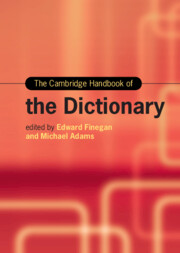Book contents
- The Cambridge Handbook of the Dictionary
- Cambridge Handbooks in Language and Linguistics
- The Cambridge Handbook of the Dictionary
- Copyright page
- Contents
- Figures
- Tables
- Contributors
- Acknowledgments
- Introduction
- Part I Types of Dictionaries
- Part II Dictionaries as Books
- Part III Dictionaries and Ideology
- Chapter 14 Dictionaries, Language Ideologies, and Language Attitudes
- Chapter 15 Dictionaries and Cultural Politics
- Chapter 16 Usage in Dictionaries and Dictionaries of Usage
- Chapter 17 Dictionaries and Language Contact
- Chapter 18 Dictionaries in Religious History and Biblical Interpretation
- Chapter 19 Attitudes Toward “The Dictionary”
- Part IV Dictionaries and Domains of Use
- Part V The Business of Dictionaries
- Part VI The Future of Dictionaries
- References: Dictionaries
- References: Secondary Works
- Index
Chapter 16 - Usage in Dictionaries and Dictionaries of Usage
from Part III - Dictionaries and Ideology
Published online by Cambridge University Press: 19 October 2024
- The Cambridge Handbook of the Dictionary
- Cambridge Handbooks in Language and Linguistics
- The Cambridge Handbook of the Dictionary
- Copyright page
- Contents
- Figures
- Tables
- Contributors
- Acknowledgments
- Introduction
- Part I Types of Dictionaries
- Part II Dictionaries as Books
- Part III Dictionaries and Ideology
- Chapter 14 Dictionaries, Language Ideologies, and Language Attitudes
- Chapter 15 Dictionaries and Cultural Politics
- Chapter 16 Usage in Dictionaries and Dictionaries of Usage
- Chapter 17 Dictionaries and Language Contact
- Chapter 18 Dictionaries in Religious History and Biblical Interpretation
- Chapter 19 Attitudes Toward “The Dictionary”
- Part IV Dictionaries and Domains of Use
- Part V The Business of Dictionaries
- Part VI The Future of Dictionaries
- References: Dictionaries
- References: Secondary Works
- Index
Summary
The complications of usage in general dictionaries and the complications of dictionaries in specialized dictionaries of usage. Superficially, usage refers to “good usage” or correctness judgments about language variation, like lie vs. lay, and general dictionaries have tried to signal such judgments for some words. Yet usage also refers to “actual usage,” “contextual usage,” and “traditional usage,” which are all bound up with the simpler notion of “good usage.” The first part of this chapter elaborates these types of usage, the relationships among them, and the ways general dictionaries have incorporated all four types. The second part focuses on specialized dictionaries that focus exclusively on usage issues in all four senses. Such dictionaries vary widely in their macro-structures and micro-structures, and the chapter provides a framework for discerning elements within the entries. Dictionaries of usage are usually better than general dictionaries in giving detailed explanations and treating more issues and more kinds of issues. They do not seem to have improved on general dictionaries for identifying the most important usage issues to be aware of.
Keywords
Information
- Type
- Chapter
- Information
- The Cambridge Handbook of the Dictionary , pp. 323 - 342Publisher: Cambridge University PressPrint publication year: 2024
